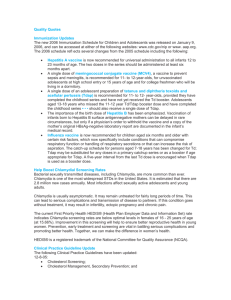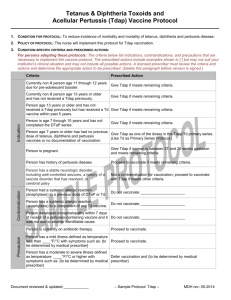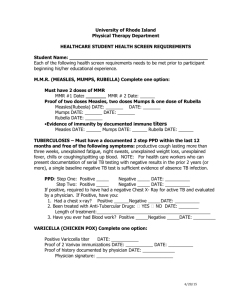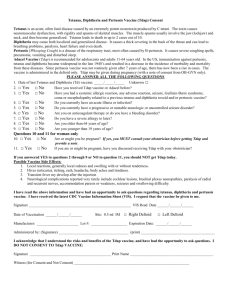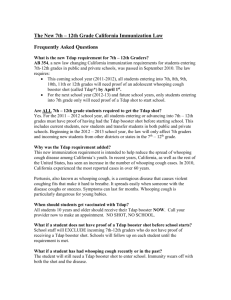AAP, CDC Update Whooping Cough Vaccine Recommendations
advertisement
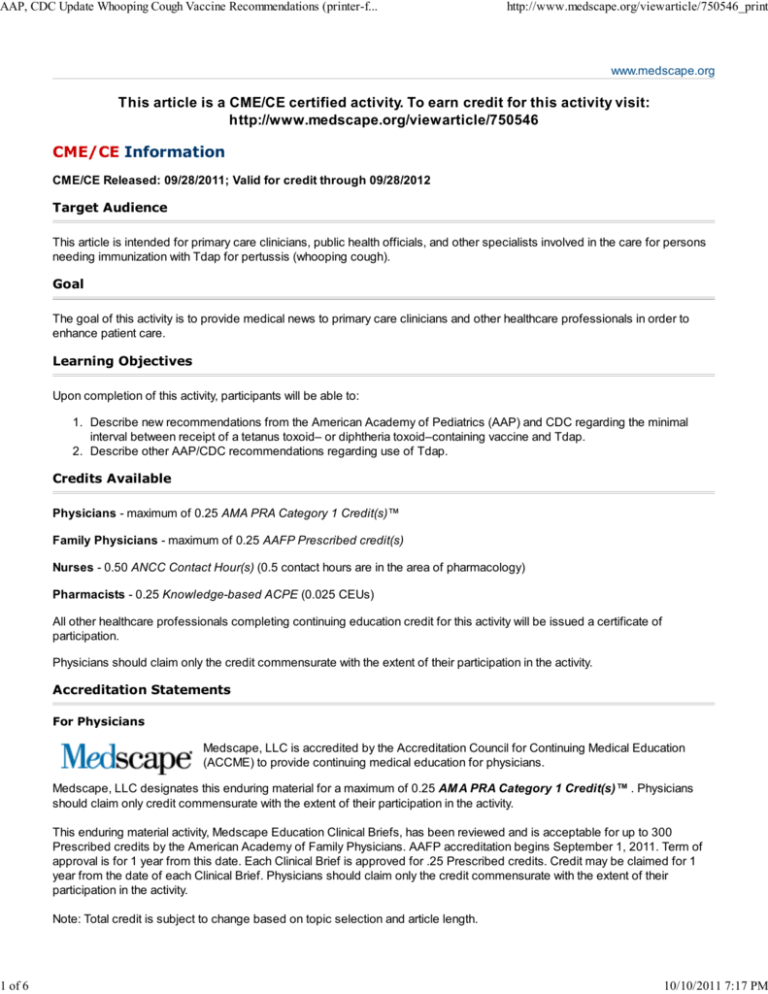
AAP, CDC Update Whooping Cough Vaccine Recommendations (printer-f... 1 of 6 http://www.medscape.org/viewarticle/750546_print www.medscape.org This article is a CME/CE certified activity. To earn credit for this activity visit: http://www.medscape.org/viewarticle/750546 CME/CE Information CME/CE Released: 09/28/2011; Valid for credit through 09/28/2012 Target Audience This article is intended for primary care clinicians, public health officials, and other specialists involved in the care for persons needing immunization with Tdap for pertussis (whooping cough). Goal The goal of this activity is to provide medical news to primary care clinicians and other healthcare professionals in order to enhance patient care. Learning Objectives Upon completion of this activity, participants will be able to: 1. Describe new recommendations from the American Academy of Pediatrics (AAP) and CDC regarding the minimal interval between receipt of a tetanus toxoid– or diphtheria toxoid–containing vaccine and Tdap. 2. Describe other AAP/CDC recommendations regarding use of Tdap. Credits Available Physicians - maximum of 0.25 AMA PRA Category 1 Credit(s)™ Family Physicians - maximum of 0.25 AAFP Prescribed credit(s) Nurses - 0.50 ANCC Contact Hour(s) (0.5 contact hours are in the area of pharmacology) Pharmacists - 0.25 Knowledge-based ACPE (0.025 CEUs) All other healthcare professionals completing continuing education credit for this activity will be issued a certificate of participation. Physicians should claim only the credit commensurate with the extent of their participation in the activity. Accreditation Statements For Physicians Medscape, LLC is accredited by the Accreditation Council for Continuing Medical Education (ACCME) to provide continuing medical education for physicians. Medscape, LLC designates this enduring material for a maximum of 0.25 AM A PRA Category 1 Credit(s)™ . Physicians should claim only credit commensurate with the extent of their participation in the activity. This enduring material activity, Medscape Education Clinical Briefs, has been reviewed and is acceptable for up to 300 Prescribed credits by the American Academy of Family Physicians. AAFP accreditation begins September 1, 2011. Term of approval is for 1 year from this date. Each Clinical Brief is approved for .25 Prescribed credits. Credit may be claimed for 1 year from the date of each Clinical Brief. Physicians should claim only the credit commensurate with the extent of their participation in the activity. Note: Total credit is subject to change based on topic selection and article length. 10/10/2011 7:17 PM AAP, CDC Update Whooping Cough Vaccine Recommendations (printer-f... 2 of 6 http://www.medscape.org/viewarticle/750546_print Medscape, LLC staff have disclosed that they have no relevant financial relationships. AAFP Accreditation Questions Contact This Provider For Nurses Medscape, LLC is accredited as a provider of continuing nursing education by the American Nurses Credentialing Center's Commission on Accreditation. Awarded 0.5 contact hour(s) of continuing nursing education for RNs and APNs; 0.5 contact hours are in the area of pharmacology. Accreditation of this program does not imply endorsement by either Medscape, LLC or ANCC. Contact This Provider For Pharmacists Medscape, LLC is accredited by the Accreditation Council for Pharmacy Education as a provider of continuing pharmacy education. Medscape designates this continuing education activity for 0.25 contact hour(s) (0.025 CEUs) (Universal Activity Number 0461-0000-11-198-H04-P). Contact this provider For questions regarding the content of this activity, contact the accredited provider for this CME/CE activity noted above. For technical assistance, contact CME@medscape.net Instructions for Participation and Credit There are no fees for participating in or receiving credit for this online educational activity. For information on applicability and acceptance of continuing education credit for this activity, please consult your professional licensing board. This activity is designed to be completed within the time designated on the title page; physicians should claim only those credits that reflect the time actually spent in the activity. To successfully earn credit, participants must complete the activity online during the valid credit period that is noted on the title page. To receive AMA PRA Category 1 Credit™, you must receive a minimum score of 70% on the post-test. Follow these steps to earn CME/CE credit*: 1. Read the target audience, learning objectives, and author disclosures. 2. Study the educational content online or printed out. 3. Online, choose the best answer to each test question. To receive a certificate, you must receive a passing score as designated at the top of the test. MedscapeCME encourages you to complete the Activity Evaluation to provide feedback for future programming. You may now view or print the certificate from your CME/CE Tracker. You may print the certificate but you cannot alter it. Credits will be tallied in your CME/CE Tracker and archived for 6 years; at any point within this time period you can print out the tally as well as the certificates by accessing "Edit Your Profile" at the top of your Medscape homepage. *The credit that you receive is based on your user profile. Hardware/Software Requirements To access Medscape Education users will need A computer with an Internet connection. Internet Explorer 6.x or higher, Firefox 2.x or higher, Safari 2.x or higher, or any other W3C standards compliant browser. Adobe Flash Player and/or an HTML5 capable browser may be required for video or audio playback. Occasionally other additional software may be required such as PowerPoint or Adobe Acrobat Reader. 10/10/2011 7:17 PM AAP, CDC Update Whooping Cough Vaccine Recommendations (printer-f... 3 of 6 http://www.medscape.org/viewarticle/750546_print AAP, CDC Update Whooping Cough Vaccine Recommendations CME/CE News Author: Larry Hand CME Author: Laurie Barclay, MD CME/CE Released: 09/28/2011; Valid for credit through 09/28/2012 Clinical Context Pertussis, or whooping cough, is a highly contagious, serious infection causing severe and violent coughing episodes. Although adolescents and adults are most often affected, infants who are too young to be immunized can contract the infection, usually from family members. In this age group, severe morbidity and mortality may result. On October 27, 2010, the Advisory Committee on Immunization Practices (ACIP) of the US Centers for Disease Control and Prevention (CDC) and the American Academy of Pediatrics (AAP) revised their recommendations regarding use of the tetanus toxoid, reduced-content diphtheria toxoid, and acellular pertussis vaccine (Tdap) and made additional recommendations for use of Tdap in persons not previously vaccinated with Tdap. The ACIP Pertussis Working Group, which included liaison members from the AAP and other organizations, based its recommendations on a review of published and unpublished data on Tdap immunogenicity and safety from vaccine trials and clinical experiences. They also reviewed the current epidemiology of pertussis, protection of susceptible infants through cocooning, and data and expert opinion on barriers to receipt of Tdap. Study Synopsis and Perspective The AAP and the CDC have revised their recommendations on the whooping cough vaccine to call for the administration of 1 vaccine at particular ages and with minimal intervals between vaccinations, according to a new policy statement published online September 26 in Pediatrics. "There are a lot of places where we have opportunities to have a positive impact, and if we don't take advantage of all of them, we're not likely to be successful," said Michael Brady, MD, from Nationwide Children's Hospital in Columbus, Ohio, and chair of the AAP infectious diseases committee. "We're finding that 7- to 10-year-olds are underimmunized, and that older adolescents, if immunized at age 11, by the time they get to age 17 or 20, they're probably not protected. Also, we're giving the vaccine to mothers during pregnancy, rather than after delivery, because that will protect the mothers, and the mothers will develop the antibodies that they will give to their babies." The 2 groups removed their previous minimum interval between administering a tetanus or diphtheria vaccine and the Tdap based on a committee's review of clinical trials and other studies that cited no excess adverse reaction when Tdap is given shortly after tetanus and diphtheria toxoid vaccine (Td). To help to prevent pertussis, the 2 groups recommend a single dose of Tdap for children aged 7 to 10 years who may have been underimmunized with DTaP or whose immunization history is incomplete. Previously the preferred ages were 11 through 18 years. At this time, the standard schedule for whooping cough vaccines lists shots at ages 2, 4, 6, and 15 to 18 months, as well as at ages 4 to 6 years and 11 to 12 years. Tdap is one of a group of pertussis vaccines used and was the first approved for ages 7 years and older. The groups recommend extending the age for administering Tdap to people aged 65 years and older and to healthcare workers of all ages — anyone who may come in contact with infants too young for vaccination — because research has shown 10/10/2011 7:17 PM AAP, CDC Update Whooping Cough Vaccine Recommendations (printer-f... 4 of 6 http://www.medscape.org/viewarticle/750546_print that grandparents are often caregivers for infants. The groups also recommend vaccination of adolescents, including pregnant adolescents, and pregnant women, whereas previously the recommendation was to wait until after pregnancy. Two Tdap vaccines are licensed in the United States: Boostrix (GlaxoSmithKline Biologicals, Research Triangle Park, NC) and Adacel (Sanofi Pasteur, Swiftwater, PA). The US Food and Drug Administration recently approved an extended age indication for Boostrix, going from ages 10 through 64 years to ages 10 years and older, as reported in the September 23 Morbidity and Mortality Weekly Report. The authors of that report wrote that Tdap can be administered with other vaccines during the same office visit. Adacel is approved for ages 11 through 64 years. Practitioners will have to use Tdap off-label to meet this new recommendation, which coincides with a preliminary report published last week indicating that the effectiveness of early-childhood whooping cough vaccines may not last as long as they are intended to last. A group from Kaiser Permanente Medical Center in San Rafael, California, presented results from a study of an outbreak of whooping cough that killed 11 infants and caused 9100 people to get sick in 2010. Fully immunized children aged 8 to 12 made up most of those cases. Researchers suggested that the effectiveness of the vaccinations at younger ages may have waned. The California group basically documented what is happening in multiple locations, said Dr. Brady, who added that the research points to the need for a booster in this age group. The body of research that went into the new guidelines dates back to the 1980s, said Sarah Long, MD, from St. Christopher's Hospital for Children in Philadelphia, Pennsylvania, and lead author of the American Academy of Pediatrics policy statement. The California report "tells you that you can still have deaths in the United States from vaccine-preventable diseases and we need to do all we can to implement vaccines in the age groups that that will protect those around them." Pediatrics. Published online September 26, 2011. Full text Related Link The Centers for Disease Control and Prevention provides extensive information on Pertussis (Whooping Cough) Vaccination including information on disease epidemiology and recognition and patient education materials available in both English and Spanish. Study Highlights The AAP and CDC have revised previous recommendations and made additional evidence-based recommendations for the use of Tdap. Review of the available evidence showed no excess reactogenicity when Tdap was given within a short interval after other tetanus- or diphtheria-containing toxoid products. Tdap has an excellent safety record, based on accrual of postmarketing adverse events reports. Therefore, the CDC and AAP removed their previous recommendation for caution regarding Tdap use within any interval after a tetanus- or diphtheria-containing toxoid product. Tdap should now be given when indicated and when there are no contraindications to its use. When Tdap is otherwise indicated, no minimal interval is required or advised between receipt of a tetanus toxoid– or diphtheria toxoid–containing vaccine and Tdap. To protect persons who are susceptible to pertussis, the AAP and CDC recommend a single dose of Tdap for children 7 through 10 years old who were underimmunized with diphtheria-tetanus-acellular pertussis (DTaP); that is, who did not receive the full recommended series of DTaP before age 7 years, or who have incomplete or unknown pertussis vaccine history. Additional vaccines may be required for these children on the basis of a catch-up schedule. The age for recommendation for Tdap is now extended to those 65 years and older who have or are likely to have contact with an infant younger than 12 months, such as healthcare personnel, grandparents, and other caregivers. A single dose of Tdap should be given to these older adults, as well as to adults of any age who have not received Tdap previously. The AAP continues to recommend vaccination of adolescents, including pregnant adolescents. The adolescent dose of Tdap should preferably be given at a preventive care visit at ages 11 through 12 years. 10/10/2011 7:17 PM AAP, CDC Update Whooping Cough Vaccine Recommendations (printer-f... 5 of 6 http://www.medscape.org/viewarticle/750546_print Pregnant women of any age should also receive Tdap. Tdap is listed in the Vaccine Injury Table for eligibility to receive compensation under the Vaccine Injury Compensation Act, and this eligibility extends to these added recommendations. In the United States, 2 Tdap vaccines are licensed: Boostrix, for persons 10 through 64 years old, and Adacel, for persons 11 through 64 years old. Clinical Implications According to revised AAP/CDC recommendations for use of Tdap, when Tdap is otherwise indicated, no minimal interval is required or advised between receipt of a tetanus toxoid– or diphtheria toxoid–containing vaccine and Tdap. The age for recommendation for Tdap is now extended to those 65 years and older who have or are likely to have contact with an infant younger than 12 months, such as healthcare personnel, grandparents, and other caregivers. Tdap is recommended for adults of any age who have not received Tdap previously, for pregnant women and adolescents, for children 7 through 10 years old who were underimmunized with DTaP, and for adolescents. CME Test To receive AMA PRA Category 1 Credit™, you must receive a minimum score of 70% on the post-test. Your patient is a 26-year-old woman who has never received a Tdap vaccination but who received a tetanus shot in the emergency department after a dog bite 2 days ago. According to the revised AAP/CDC recommendations, which of the following statements would most likely apply to vaccination with Tdap? Tdap elicits excess reactogenicity when given within a short interval after other tetanus- or diphtheria-containing toxoid products Postmarketing adverse events reports suggest significant safety issues with Tdap The CDC and AAP now recommend caution regarding Tdap use within a short interval after a tetanusor diphtheria-containing toxoid product She may receive Tdap at this visit if she has no contraindications to use According to the revised AAP/CDC recommendations, which of the following statements about Tdap use is not correct? The adolescent dose of Tdap should preferably be given at a preventive care visit at ages 11 through 12 years Pregnant adolescents should not receive Tdap Children 7 through 10 years old who were underimmunized with DTaP should receive a single dose of Tdap The age for recommendation for Tdap is now extended to those 65 years or older who have or are likely to have contact with an infant younger than 12 months This article is a CME/CE certified activity. To earn credit for this activity visit: http://www.medscape.org/viewarticle/750546 Medscape Education © 2011 Medscape, LLC Disclaimer 10/10/2011 7:17 PM AAP, CDC Update Whooping Cough Vaccine Recommendations (printer-f... 6 of 6 http://www.medscape.org/viewarticle/750546_print The material presented here does not necessarily reflect the views of Medscape, LLC, or companies that support educational programming on www.medscape.org. These materials may discuss therapeutic products that have not been approved by the US Food and Drug Administration and off-label uses of approved products. A qualified healthcare professional should be consulted before using any therapeutic product discussed. Readers should verify all information and data before treating patients or employing any therapies described in this educational activity. Send comments and news tips to news@medscape.net. This article is a CME/CE certified activity. To earn credit for this activity visit: http://www.medscape.org/viewarticle/750546 10/10/2011 7:17 PM
